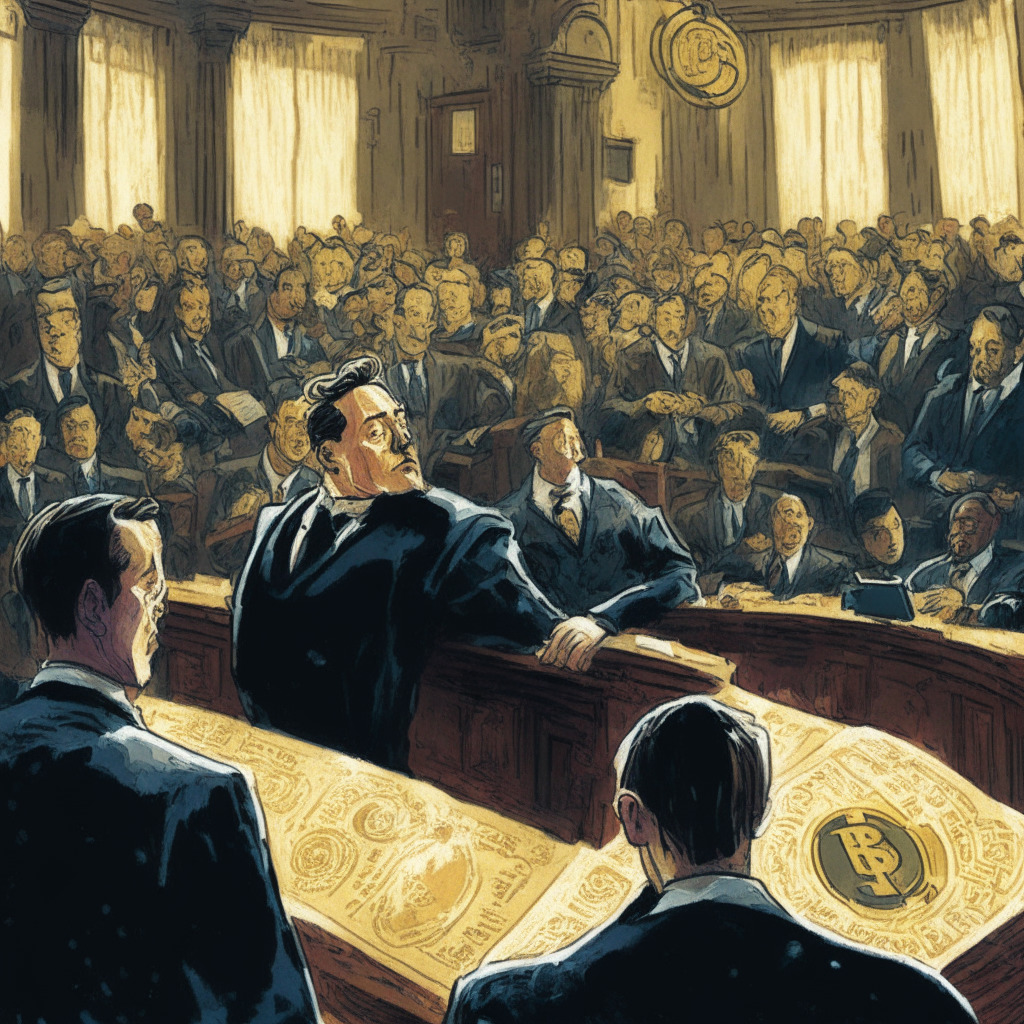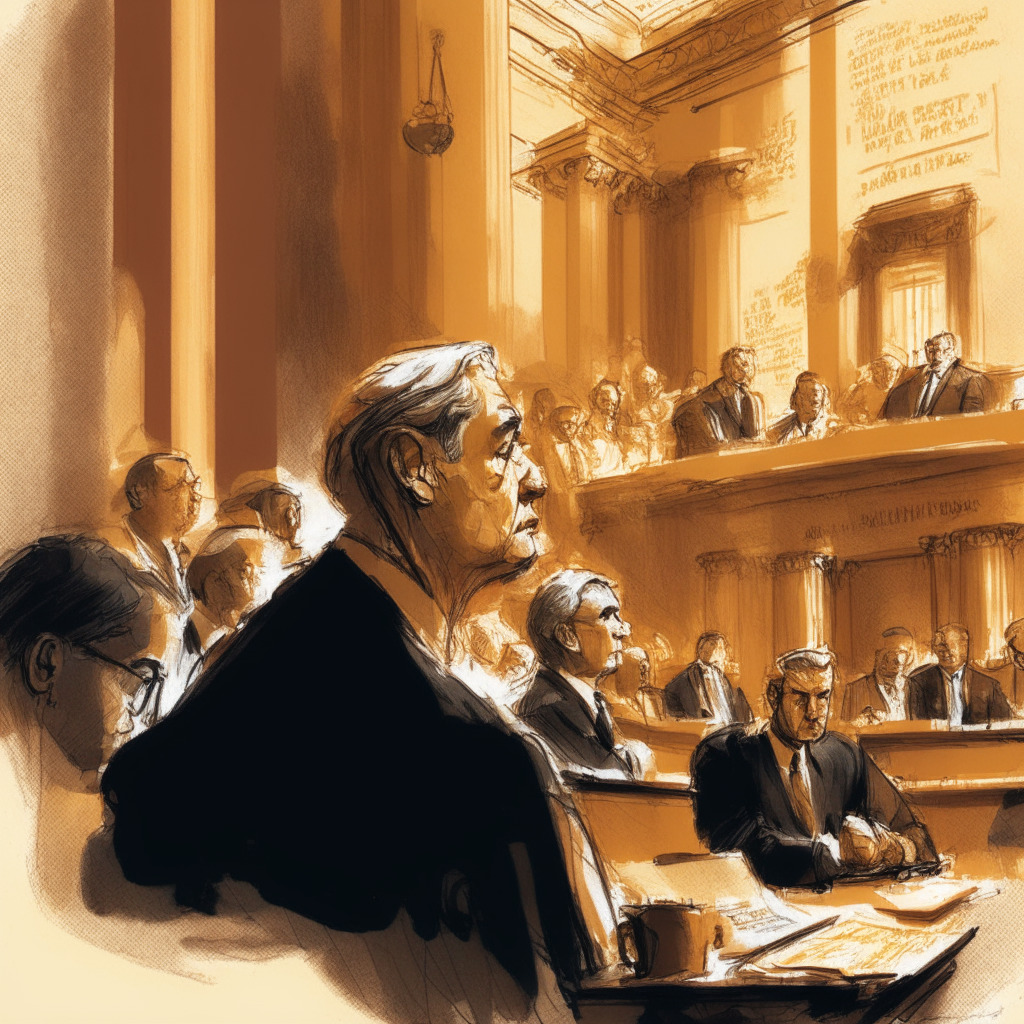The recent ruling classifying XRP as a security could impact creditor repayments for holdings of crypto lender Celcius’ token CEL under U.S. bankruptcy laws. This decision, alongside Celcius’ legal challenges, marks a significant shift in cryptocurrency regulation, potentially impacting investor trust in crypto assets.
Search Results for: US SEC
Crucial Steps in SEC vs Ripple Case: A Litmus Test for Crypto Regulations and Market Impact
U.S. District Judge Analisa Torres referred the ‘SEC versus Ripple’ case to Magistrate Judge Sarah Netburn, signaling potential settlement discussions. Judge Torres dismissed the claim that Ripple broke the law by listing XRP on public exchanges, landmark progress suggesting XRP isn’t a security. However, speculation about XRP being sold as a security when Ripple marketed it to investors still prevails.
Bitcoin’s Precarious Balance: The Impact of Coinbase Account Termination and SEC vs. Ripple Saga
Bitcoin’s market position returns to its strong support level of $30,000 amidst user claims of terminated bank accounts due to Bitcoin transactions. Regulatory complexities regarding XRP’s status and ongoing crypto discussions heightens the anticipation surrounding Bitcoin’s next financial trajectory.
Coinbase Staking Services Halted: An Ongoing Battle with the SEC & Its Potential Impact on the Crypto Industry
Coinbase, US-based cryptocurrency exchange, has temporarily halted staking services in four US states following SEC’s lawsuit accusing them of selling unregistered securities. Amid regulatory scrutiny, Coinbase argues that their staking services aren’t securities, challenging established legal protocols and definitions of investment contracts.
Unpacking the Coinbase Controversy: SEC Approval vs Endorsement of Blockchain Businesses
The SEC argues that its approval of Coinbase’s public listing should not be misconstrued as backing the company’s business model or regulatory compliance. This counterargument arises as the SEC faces scrutiny over its diligence and oversight of rapidly evolving blockchain companies preparing to go public.
Ripple’s XRP Reignites Debate: Binance.US Opens Trading Amidst Security Issues
Ripple’s XRP token is now trading on Binance.US following a US federal court ruling that secondary markets of XRP on exchanges are not securities. This is set to intervene the crypto space as exchanges like Coinbase, Kraken, and Bitstamp have already enlisted the XRP token. However, ambiguities regarding token securities remain due to a lack of clarity on primary sales.
Court Ruling Clears XRP as Security: An Opportunity or Challenge for Crypto Industry?
“A U.S. district court’s ruling establishes that Ripple’s XRP token isn’t a security if sold via an exchange, providing relief for XRP investors. This decision marks a turning point for the digital assets framework, suggesting a possible shift in perspective for institutional investors previously wary of regulatory complications within the crypto industry.”
Regulating Digital Assets: The SEC’s Paradox, Investor Protection versus Technological Growth
Congressman Ritchie Torres criticizes SEC’s inconsistent approach to digital assets, highlighting the dubious licensing of a particular trading platform. Torres questions if this strict regulatory approach is protecting investors or hindering technological innovation, emphasizing the need for a balance between regulation, investor protection, and progress in digital asset market.
Ripple vs SEC: The Unexpected Victory and Its Repercussions on the Crypto World
“Ripple Labs won a key victory in a U.S. district court against the SEC, which had argued Ripple’s token, XRP, constituted a security and required additional regulation. This important ruling potentially sets a precedent for other cryptocurrencies faced with similar legal challenges, but doesn’t guarantee their immunity against the securities label, potentially affecting market growth and innovation.”
NFT Ticketing Upstart Get Protocol Secures $4.5 Million: Challenging the Giants or Too Ambitious?
Non-fungible token (NFT) ticketing company Get Protocol has secured $4.5 million in new funding, amid dwindling fundraising climate subsequent to the fall of the FTX exchange. The funds contributed by Flow Ventures and other notable Web3 companies aim to create an alternative to dominant entities such as Ticketmaster.
Navigating the Legal Tussle: Can SEC Lawsuits Shape the Future of Cryptocurrencies?
Paradigm, a crypto investment firm, opposes the SEC’s case against crypto exchanges like Bittrex, claiming the SEC is wrongfully trying to govern crypto secondary markets. It suggests the SEC should work alongside Congress to produce crypto legislation promoting innovation and ensuring investor safety.
SEC’s Dubious Stance on Bitcoin Spot ETFs: Ripple Lawyer’s Critique & Market Predictions
“Bitcoin experiences a slight uptick with the SEC’s approval of Grayscale’s Bitcoin Futures ETF. However, concerns linger over spot Bitcoin ETFs. The SEC’s decision, current market accessibility and mainstream acceptance of Bitcoin prompt optimism for potential regulatory approval for Spot ETFs.”
The SEC’s Joust with Crypto: Regulatory Overreach or Necessary Oversight?
“Paradigm’s Special Counsel Rodrigo Seira criticizes the SEC’s recent actions against secondary crypto markets and U.S.-based crypto exchange Bittrex as overstepping jurisdiction. Seira argues crypto-assets do not fall under the SEC’s purview, highlighting the need for clearer regulatory framework.”
SEC Accuses Coinbase of Breaching Security Laws: Unpacking the Crypto Regulation Debate
“In a recent case of crypto-regulation, the US SEC accused Coinbase of breaching federal securities law. Coinbase argued they informed shareholders of possible conflict with these policies. This dispute highlights key issues regarding categorization and regulation of digital currencies, potentially setting a precedent for future cryptocurrency regulation.”
Coinbase vs SEC: A Tussle of Regulatory Authority and Crypto Listings’ Legalities
The SEC has accused Coinbase of functioning as an unregistered broker and listing unregistered securities, contradicting Coinbase’s claim to immunity from such lawsuits. The SEC argues that Coinbase knowingly risked violating federal securities laws for business expansion, outlining the growing regulatory complications in the cryptocurrency industry.
Musk Challenges Alleged Conflict in $258B Dogecoin Lawsuit Amid BIS CBDC Cybersecurity Efforts
“Elon Musk and Tesla face a $258 billion lawsuit over alleged misconduct related to Dogecoin cryptocurrency. Meanwhile, the Bank for International Settlements is developing a framework to protect Central Bank Digital Currencies from cyber threats, underlining the tension and commitment within the crypto and traditional financial ecosystems to the blockchain future.”
BIS Strategy for Securing Digital Currencies: A Robust Framework or a Step Towards Centralization?
The Bank for International Settlements (BIS) has released a strategy to protect central bank digital currencies (CBDCs) from cyber threats. The security framework aims to ensure confidentiality, integrity, and availability for CBDC transactions, considering potential security risks prevalent in decentralized finance (DeFi). However, the implementation of such a security model could require significant resources and may lead to debates over centralization in a decentralization-based ecosystem.
Unmasking the Cross-chain Protocol Loopholes: The $42 Billion Illusion Attack and the Future of Blockchain Security
Attackers reportedly exploited the cross-chain protocol of PolyNetwork’s bridge tool, minting billions of tokens on different blockchain platforms to create an illusion of a ballooned wallet. However, lack of liquidity ultimately prevented them from capitalizing on this ill-gotten wealth. This incident highlights the need for vigilant security in the blockchain ecosystem.
Mind Network: A New Hope for Web3 Data Security and User Privacy
“Mind Network, a platform aimed at improving web3 data security and privacy, has raised $2.5 million in seed funding. The company provides end-to-end encryption for users, ensuring autonomy over personal data and financial transactions. The funds received will be directed towards enhancing technology, fostering adoption across sectors, and strengthening data privacy and ownership for global users.”
Expanding Cryptocurrency Custody: Fireblocks Partners with Cloud Giants, Security Concerns Linger
Cryptocurrency custody technology provider Fireblocks has expanded its support to cloud service providers including Amazon Web Services, Google Cloud Platform, Alibaba Cloud, Thales, and Securosus, aiming to cater to banks using on-premise and cloud-based IT infrastructures.
Notorious Twitter Hacker Sentenced: A Lesson in Blockchain Security and Crime Enforcement
Joseph O’Conner, a 24-year-old involved in the 2020 Twitter hack, has been sentenced to five years in prison and implicated in a separate SIM swapping scheme. The hack targeted high-profile accounts, soliciting Bitcoin from followers. O’Conner’s sentencing highlights authorities’ increasing efficiency in tackling cryptocurrency-related crimes and raises concerns over high-profile account safety on social media platforms.
Navigating the Regulatory Dilemma: Binance, Coinbase and the SEC’s Ambiguous Stance
The legal complications faced by Binance and Coinbase highlight the inconsistent and unclear approach adopted by regulatory bodies like the SEC. Increased collaboration and well-defined guidelines could ensure stability and growth of the cryptocurrency market, balancing security and innovation.
Ether ETFs: A Real Possibility or Just Publicity Stunts? Analyzing SEC’s Stance on Approval
The fate of not-yet-filed ether funds depends on the SEC’s treatment of the latest wave of spot bitcoin ETF filings. A bitcoin ETF approval might encourage fund issuers to try ether next, while regulatory clarity could increase ether ETF’s chances in the future.
The Quest for a US Bitcoin Spot ETF: Resilience Amid SEC Rejections and Renewed Hope
Since 2013, the crypto community has pursued elusive spot Bitcoin ETFs. Interest in Bitcoin ETFs has grown globally, with Canada, Brazil, and Dubai embracing them. Despite numerous rejections, the industry remains optimistic, and BlackRock’s recent application has spurred other major companies to apply for Bitcoin spot ETFs, suggesting market resilience and potential for a U.S. Bitcoin ETF.
Valkyrie Bitcoin ETF Filing Amid SEC Pressure: Examining Future of Crypto ETFs & Industry Conflict
Valkyrie Funds has filed an application with the SEC for a Bitcoin ETF, joining other companies like BlackRock, Invesco, and WisdomTree. The proposed Valkyrie Bitcoin Fund aims to provide investors a cost-effective way to invest in Bitcoin, using the CME CF Bitcoin Reference Rate Variant as a benchmark.
Gary Gensler, SEC, and the Crypto Conundrum: US vs EU Regulations and the Battle Ahead
SEC Chair Gary Gensler faces criticism for his broad approach to cryptocurrencies, causing venture capital investment in the U.S. crypto industry to decline compared to the European Union. The EU’s MiCA legislation acknowledges utility tokens, providing a clear framework for digital assets. New legislation is needed in the U.S. to address the definition of securities and digital asset regulation.
CACEIS Crypto Custody License: Balancing Security & France’s Tightening Regulations
CACEIS Bank, the asset servicing subsidiary of Crédit Agricole and Santander, acquires crypto custody license in France to store users’ private keys and increase institutional clients’ security. With a €2.4 trillion AUM, CACEIS avoids France’s impending stricter regulations while adhering to the EU’s MiCA legislation next year.
Atomic Wallet Hack: Uncovering Causes, Tracking Funds, and Strengthening Security
Atomic Wallet recently disclosed new details about its June 3 hack, affecting less than 0.1% of its users. The company is working to recover lost funds and collaborating with exchanges and blockchain analysis firms Chainalysis and Crystal. While the total amount stolen remains undisclosed, Elliptic reported a figure of over $100 million, with possible links to the North Korean hacking group Lazarus.
Fed Chair Powell Pushes for Central Bank-Regulated Stablecoins: Innovation vs Security Debate
Federal Reserve Chair Jerome Powell emphasizes the need for a strong federal presence in stablecoin supervision during a monetary policy hearing, asserting the central bank’s crucial role in oversight. As the crypto landscape evolves, creating a regulatory framework that balances stablecoins’ potential benefits and investor protection is vital for future success.
US Court Awaits SEC Reply: The Impact on Crypto Regulations and Industry Uncertainty
The United States Court of Appeals for the Third Circuit has retained jurisdiction in Coinbase’s pursuit of regulatory clarity from the SEC, demonstrating the importance of transparent crypto regulations. This development marks a potentially pivotal moment for the future of the cryptocurrency industry in the United States, as the forthcoming SEC report could significantly impact the market.
68 Blockchain Tokens Classified as Securities: Implications for Users and Exchanges
The SEC has identified 68 blockchain tokens, including Solana’s SOL and Cardano’s ADA, as securities, affecting over $100 billion assets. The classification raises questions on users’ access and potential regulatory constraints on centralized exchanges, while highlighting the challenge in balancing regulations and blockchain technology’s open nature.
SEC vs Binance.US Showdown: Unearthing Past Statements and Facing New Legislation
The U.S. SEC’s intention to freeze Binance.US’s assets faced a setback as Judge Amy Berman Jackson advised bilateral negotiations. Meanwhile, HKMA urges banks to accept crypto exchanges as clients, and the European Parliament passes the EU Artificial Intelligence Act, impacting governance of AI technologies.






























